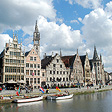PASSCHENDAELE 1917 MEMORIAL MUSEUM
Battlefield Tunnels and Tyne Cot Cemetery
 Recently a stone was discovered in a river in Northern Ireland. It had
a unique inscription on it, causing a stir of mystery and wonder. The
stone
was
a marker for a soldier, one Lt. Robert Kelly Pollin, who died in World
War I in the battle of Passchendale. The mystery – how did it get
to Ireland from the fields of Flanders in Belgium was featured in a BBC
documentary series "The Soldier and the Stone". The stone marker
has been returned to the Passchendaele battlefield site museum rejoining
his fellow soldiers, many still anonymous with no names, resting in the
solemn ground of the nearby Tyne Cot Cemetery.
Recently a stone was discovered in a river in Northern Ireland. It had
a unique inscription on it, causing a stir of mystery and wonder. The
stone
was
a marker for a soldier, one Lt. Robert Kelly Pollin, who died in World
War I in the battle of Passchendale. The mystery – how did it get
to Ireland from the fields of Flanders in Belgium was featured in a BBC
documentary series "The Soldier and the Stone". The stone marker
has been returned to the Passchendaele battlefield site museum rejoining
his fellow soldiers, many still anonymous with no names, resting in the
solemn ground of the nearby Tyne Cot Cemetery.
 The
battles of World War I continued in West Flanders around Ypres for almost
the entire length
of the war. The small villages of Zonnebeke and Passchendaele are just
along the road to the north of Ypres (Ieper), where the British
Commonwealth forces fought a counter attack against the Kaiser’s
Wehrmacht. For one hundred days in 1917 a half-million British, Canadian,
Australian,
New Zealand and South African troops perished in the fighting to gain
5 miles against the Germans. The battle and its location acquired the
more Anglicized Passiondale, and came to symbolize the senselessness
of that brutal incomprehensible war.
The
battles of World War I continued in West Flanders around Ypres for almost
the entire length
of the war. The small villages of Zonnebeke and Passchendaele are just
along the road to the north of Ypres (Ieper), where the British
Commonwealth forces fought a counter attack against the Kaiser’s
Wehrmacht. For one hundred days in 1917 a half-million British, Canadian,
Australian,
New Zealand and South African troops perished in the fighting to gain
5 miles against the Germans. The battle and its location acquired the
more Anglicized Passiondale, and came to symbolize the senselessness
of that brutal incomprehensible war.
"Passiondale" 1917 Memorial Museum
 The museum is housed in a former
noble’s
manor, the Zonnebeke Castle, tells the story of that long struggle with
images, historical artifacts, movies, uniforms and weapons, of both the
allied and German sides in life-like dioramas, with the second largest
collection
of WWI memorabilia in
Belgium (see Brussels
Royal Army Museum).
Of particular interest
The museum is housed in a former
noble’s
manor, the Zonnebeke Castle, tells the story of that long struggle with
images, historical artifacts, movies, uniforms and weapons, of both the
allied and German sides in life-like dioramas, with the second largest
collection
of WWI memorabilia in
Belgium (see Brussels
Royal Army Museum).
Of particular interest  are
the exhibits of the use of poison gas as it
developed
over
the course
of
the war,
first
chlorine
gas delivered by bomb shells, blown by the drifting
prevailing winds across the battlefields, first with no defense, then
the changing
development
of gas masks, made largely ineffective against the later “Mustard” gas,
which would permeate the skin as well as the lungs.
are
the exhibits of the use of poison gas as it
developed
over
the course
of
the war,
first
chlorine
gas delivered by bomb shells, blown by the drifting
prevailing winds across the battlefields, first with no defense, then
the changing
development
of gas masks, made largely ineffective against the later “Mustard” gas,
which would permeate the skin as well as the lungs.
Tunnels
 The museum’s
most noted feature is its replica of the underground network of tunnels
where much
of the British forces, like Lt. Pollin, lived like moles as the land
above was decimated and churned by near constant bombs and artillery
barrages. The dugout tunnels, connected by timber-lined passages and chambers,
include a communication room, medical dressing post, workspaces and
cramped
dormitory bunk rooms where the soldiers might often find themselves
trapped in
total darkness as the earth shook around them.
The museum’s
most noted feature is its replica of the underground network of tunnels
where much
of the British forces, like Lt. Pollin, lived like moles as the land
above was decimated and churned by near constant bombs and artillery
barrages. The dugout tunnels, connected by timber-lined passages and chambers,
include a communication room, medical dressing post, workspaces and
cramped
dormitory bunk rooms where the soldiers might often find themselves
trapped in
total darkness as the earth shook around them.
Tyne Cot Cemetery
 Just
about a mile from the Passchendaele Museum is the largest British Commonwealth
military cemetery from the First World War, Tyne Cot Cemetery,
with 12,000 marked graves in neat rows across the slighting rolling
field where much of the fighting took place, churned earth now hallowed
ground.
The most striking feature of the Tyne Cot Cemetery is that by far the
majority of grave markers have no name, simply dedicated a “Soldier
of the Great War”, some with the Regiment listed. The anonymous
stones stand with planted flowers side by side with those of the identified
dead.
Often,
groups
of mostly
English visitors can be found among the rows, looking for a lost relative,
a hoped for memory. A visitors book is deposited in the gate of the cemetery
to leave a name and at the far
end of the grave rows the “Memorial of the Missing” faces
in the direction of the battle front.
Just
about a mile from the Passchendaele Museum is the largest British Commonwealth
military cemetery from the First World War, Tyne Cot Cemetery,
with 12,000 marked graves in neat rows across the slighting rolling
field where much of the fighting took place, churned earth now hallowed
ground.
The most striking feature of the Tyne Cot Cemetery is that by far the
majority of grave markers have no name, simply dedicated a “Soldier
of the Great War”, some with the Regiment listed. The anonymous
stones stand with planted flowers side by side with those of the identified
dead.
Often,
groups
of mostly
English visitors can be found among the rows, looking for a lost relative,
a hoped for memory. A visitors book is deposited in the gate of the cemetery
to leave a name and at the far
end of the grave rows the “Memorial of the Missing” faces
in the direction of the battle front.
 If
looking for the story of a particular soldier in the war, or researching
the particulars of the participants, the museum has the Passchendaele
Archive Project, placing faces and stories with the names of the dead
and the missing, through photographs, family letters, documents and
military source information. A guide can be also be arranged at the
Passchendaele
1917 Museum to visit the site of the German trench lines in “Bayernwald” and
the strategic points of Gravental and the Polygon Wood along the Menin
Road.
If
looking for the story of a particular soldier in the war, or researching
the particulars of the participants, the museum has the Passchendaele
Archive Project, placing faces and stories with the names of the dead
and the missing, through photographs, family letters, documents and
military source information. A guide can be also be arranged at the
Passchendaele
1917 Museum to visit the site of the German trench lines in “Bayernwald” and
the strategic points of Gravental and the Polygon Wood along the Menin
Road.
War Memorials
 Passchendaele
and Tyne Cot are monuments for the British Commonwealth, but Americans
fought on the same ground. On the road from Ypres to Zonnebeke,
at the edge of the field now grazed by cows producing the milk for
the nearby Passchendaele cheese dairies is the Mount Kemmel American
War
Memorial commemorating the 27th and 30th Divisions of the American
Army who fought beside the British in the Ypres-Lys Offensive of August-September,
1918. Not a cemetery, but a marker with a description of the battle
where
over 2,000 were killed (most of them buried in the Flanders Field American
Cemetery near Waregem). Nearby, the road signs point in nearly every
direction to war memorials, to the Canadians, New Zealanders, all under
ten minutes by car from the center Ypres with its Menin Gate Memorial,
the Flanders Field Museum in the town hall, and the St George Memorial
Church dedicated to the British Soldiers who fought in Ypres Salient
during the not so “Great War”. © Bargain
Travel Europe
Passchendaele
and Tyne Cot are monuments for the British Commonwealth, but Americans
fought on the same ground. On the road from Ypres to Zonnebeke,
at the edge of the field now grazed by cows producing the milk for
the nearby Passchendaele cheese dairies is the Mount Kemmel American
War
Memorial commemorating the 27th and 30th Divisions of the American
Army who fought beside the British in the Ypres-Lys Offensive of August-September,
1918. Not a cemetery, but a marker with a description of the battle
where
over 2,000 were killed (most of them buried in the Flanders Field American
Cemetery near Waregem). Nearby, the road signs point in nearly every
direction to war memorials, to the Canadians, New Zealanders, all under
ten minutes by car from the center Ypres with its Menin Gate Memorial,
the Flanders Field Museum in the town hall, and the St George Memorial
Church dedicated to the British Soldiers who fought in Ypres Salient
during the not so “Great War”. © Bargain
Travel Europe
Brussles to Paris Get Thalys High Speed Tickets
Find best vacation & hotel deals in Flanders on Trip Advisor
Web Info
Passchendaele
Museum
These articles are copyrighted and the sole property of Bargain Travel Europe and WLPV, LLC. and may not be copied or reprinted without permission.
SEE ALSO:
ST
GEORGE’S WWI MEMORIAL CHURCH - YPRES
OUDE KASSMAKERJI - CHEESE MAKING - PASSENDALE
GRAVENSTEEN - COUNT'S CASTLE - GHENT
DURBUY - PRETTIEST TOWN ON THE OURTHE
BRITAIN’S UNKOWN WARRIOR REMEMBRANCE TOUR

